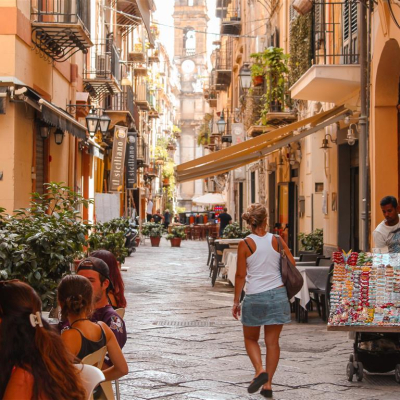Getting Started as a TEFL Teacher in Italy

Here’s some advice on how to land a teaching job, how to settle here when you do, and how to make la dolce vita a little easier to achieve.
Working in Italy is a dream for many aspiring TEFL teachers. And why wouldn’t it be? Delicious food, beautiful countryside, friendly people, bustling cities…the list goes on and on. However, fierce popularity equals fierce competition. Indeed, Italy is one of the most coveted TEFL destinations.
However, don’t despair! There are still plenty of TEFL opportunities up for grabs. I’m proof, having moved here from Germany at the start of this year.
Here’s some advice on how to land a teaching job, how to settle here when you do, and how to make la dolce vita a little easier to achieve.
Job Prospects
The general level of English in Italy is low, which is a bonus for wannabe TEFL teachers. Initially, I was worried that the current economic crisis in Italy would be detrimental to my job search. To the contrary, after moving here and speaking to other teachers, it seems that English (particularly business English) is actually in greater demand because of the crisis. More businesses in Italy are apparently putting emphasis on second languages to strengthen their position in Europe.
Job prospects are admittedly easier to find for residents of the EU; the bureaucracy here is notoriously bad, and many employers are reluctant to take on the paperwork that comes with US citizens.
In the North, the average TEFL wage is between 1000 and 1300 euro in a language school, for about 25-28 hours a week. In the South, this will be less. January and September are primetime recruiting times, with the summer workload drastically dropping; many schools close for the entire month of August.
If you teach private students, you can have a more flexible schedule and command more money: up to around 20 euro an hour. Try advertising on sites such as www.bakeca.it and http://www.subito.it. Networking is also the preferred way of working here, and key for your success. Once you get one work contact, it is much easier to get another, and another. Persevere, and talk to as many people as you can. You never know who has a potential job opportunity.
Start-up costs
The start-up costs in Italy can be surprisingly high. Indeed, they were much more than I anticipated. I know it goes without saying, but I’m serious when I say bring as much cash as you can. In particular, accommodation can be an expensive venture. Apartments here can be sky-high, especially when taking into account the average Italian wage of 1000 euros. Average rent can easily take up half this wage, and that’s not taking into consideration bills. No wonder that Italians live with their parents well into adulthood.
Research accommodation options as much as you can before you land in Italy. That way, you can have a good idea of what to expect. Typically, the north has higher wages and higher rent than the south, and the big cities have the most competition. Apartment deposits are at least two, if not three, months’ rent, and there can be extra fees for agencies and administrative procedures. It’s better to bring an Italian speaking friend along during your search to clarify everything, so you know exactly how much money you need to pay.
Flatsharing is also a good way of slashing costs. I initially wanted to live alone, but the average rent in Parma averaged around the 500 euro mark, for a less-than-average apartment. Now I share with two girls, and pay less than half this. You know what you want from your experience, and you know your own budget. Weigh up the pros and cons, but make sure to be prepared.
Settling In
As stated above, the level of English is typically low here. Whilst this is good for your workload (and wallet), it can make getting around town a little difficult. Even a basic knowledge of Italian will make your life so much easier, from going to the grocery store to posting a letter. Italians really appreciate your efforts, no matter how much their lovely language is butchered – I should know! - and will try their best to help you.
Taking Italian classes is also a good way to help integrate, and meet some new people. Networking is again important here to finding events in town. Couchsurfing and Internations are two reliable sources to make contacts online, but aside from that I was surprised to find not so many events are advertised online. It’s more usual to hear about events via word of mouth.
From my initial experience, it is very easy to meet new people in Italy. Both expats and locals seem friendly and helpful. The important thing is to keep an open mind, keep positive and try and meet as many people as possible. You’ll never know who you meet, or who you’ll click with, at what event.
Conclusion
Italy is a fabulous country to experience living in, and a place I highly recommend. The above elements can be stressful, it’s true. But as long as you are prepared, research as much as possible, and make sure to bring enough cash for your first few weeks, everything should run smoothly. In turn, all this initial planning will make your time here so much better – and relaxed - in the long run. And isn’t “relaxed” why we want Italy in the first place?
Buona fortuna!
By Alex Pendleton who moved to Parma, Italy, in January 2013 to teach (and eat mountains of pasta) after a ten-month teaching stint in Dessau, Germany. Read more at http://alexanditaly.blogspot.com.
For more information on finding a job abroad as an English Teacher, read our article “Finding a Job after Earning your TEFL Certificate”.
- My Life Abroad -
A selection of expat stories

"A fun compulsive read!"
J. Matcham, Amazon
"I strongly advise people ready to live abroad to read this book!"
Patrice, Amazon

 International Schools in Italy
International Schools in Italy Four Tips to Choose Italian Language Classes in Italy
Four Tips to Choose Italian Language Classes in Italy 5 Top International Education Systems For Expat Kids
5 Top International Education Systems For Expat Kids Babbel
Babbel Embassies and Consulates in Italy
Embassies and Consulates in Italy Working in Italy for foreign nationals: tips and steps
Working in Italy for foreign nationals: tips and steps